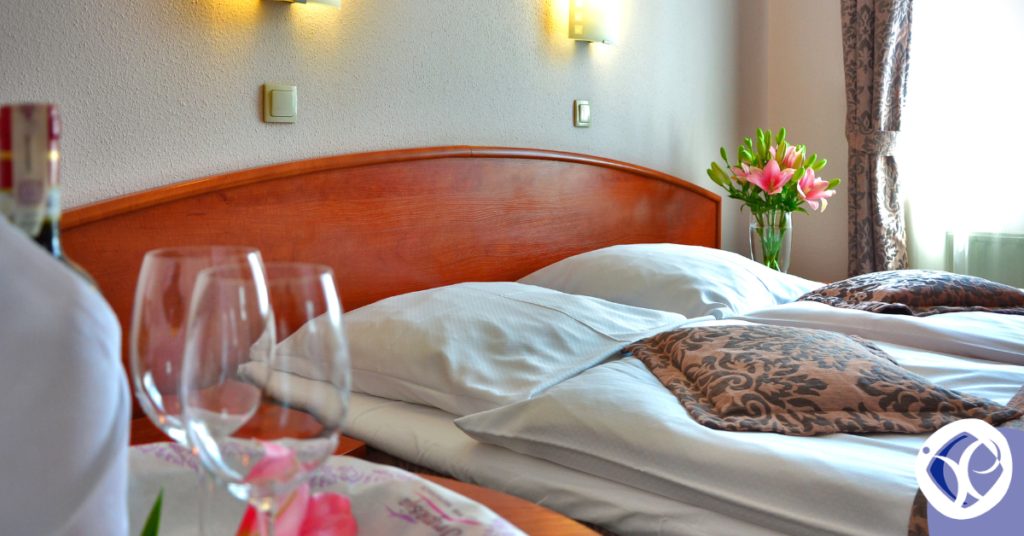Travelling on business can be tax-deductible, including accommodation costs. By being aware of the rules, you can make the most out of your business expenses. Find out how the ‘wholly and exclusively’ rule applies to accommodation costs!

(4-minute read)
We will cover:
- All about the ‘wholly and exclusively’ rule for business expenses
- How you can claim tax relief for accommodation costs
Wholly and exclusively rules
If you want to deduct business expenses off your profits, you must be aware of the rules.
‘Wholly and exclusively’ means:
- these expenses must be only for the business
- must occur while doing business or trying to get more business
- the amount should be reasonable for the person using it
There are special rules for expenses to fall within this category.
Bear in mind that you can only deduct part of the business expenses if there is any personal use involved.
This is because ordinary living expenses are not tax-deductible.
Examples
HMRC tend to allow overnight accommodation costs for short business trips or for itinerant workers in court cases.
However, if your stay lasts more than 6-9 months, you may be denied a tax deduction.
HMRC sometimes deny tax relief on the basis that accommodation and other expenses provide warmth and shelter (which is different from business use), but this has been contradicted in case law.
There are various cases such as:
• flat rentals
• hotel stays
• club memberships
…which have been considered tax-deductible.
Are accommodation costs tax-deductible?
In the aforementioned example, itinerant workers such as subcontractors are generally allowed to claim tax relief for their accommodation costs as it is considered a necessary part of their work.
But it can be difficult for a sole trader to stay in a flat for business purposes.
Tim Healy in 2015
Let’s look at the case of Tim Healy, who in 2015 tried to claim tax relief for staying in a flat for business purposes.
He claimed he preferred to stay in a flat for nine months so he could have his friends and family stay with him, which wasn’t possible in a hotel.
This was considered a “fatal dual purpose” as the expense was seen as both for private and business purposes.
The argument that staying in a flat was cheaper wasn’t considered relevant.
The Upper Tribunal considered a similar case in 1965 which seems to contradict this argument.
A company director was allowed to deduct the cost of a club membership in London as it was cheaper than staying in a hotel.
The tribunal in the Healy case stated that there is no specific rule on the length of a tenancy that makes it a dual purpose, it will depend on the specific circumstances.
HMRC rules for business trips
According to HMRC’s guidelines, you can deduct the expenses for business trips.
This can include fuel, tolls, and parking fees when travelling by car, for example.
As exemplified above, you can also claim for accommodation costs.
Whether you can claim depends on the purpose of the expense.
To claim a tax deduction for business expenses, these must be made only for the purpose of running the business (i.e., generating income) and not for generating capital.
If the expenses are for generating income, they are considered a revenue expense and are deductible.
Wholly and exclusively and necessarily
Business expenses are deductible as long as they are only for the purpose of the business, regardless of whether they are necessary or not.
Unlike employment expenses, there is no need for the expense to be necessary for it to be deductible.
Don’t miss out on valuable tax deductions!
If you’re unsure whether your business expenses, including accommodation costs, are tax-deductible, turn to the experts.
Contact us at info@taxexpert.co.uk today and get the answers you need to make informed financial decisions for your business. Don’t wait, take control of your taxes now!
Contact us today at 01772 788200 to find out more about how we can help, or WhatsApp us out-of-hours at 07787 010190.
Sending an e-mail is simple too, just fill out this short form and we’ll get back to you!
Kind regards Ilyas
